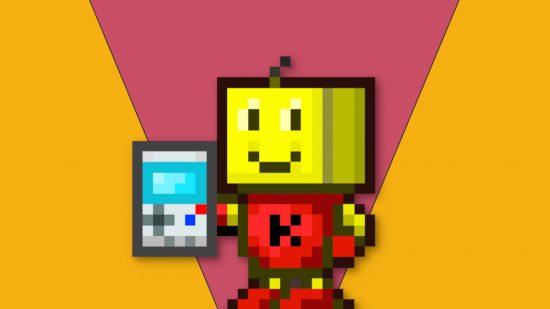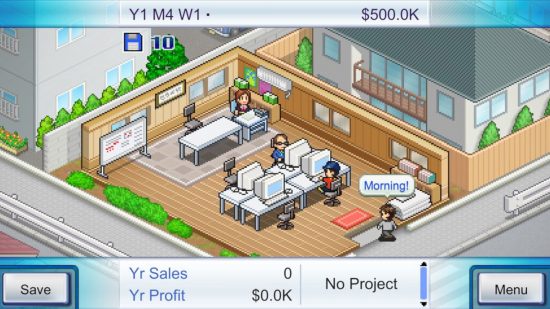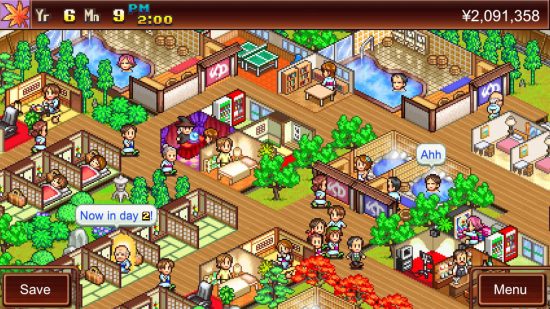In this series of history lessons, we rarely get to touch on mobile developers because most of them haven’t been around all that long. The slow dawn of mobile gaming took until the smartphone to really get going, but there’s a company that goes way back before that, before the flip phone, even. Kairosoft, the creators of Game Dev Story and countless other compact simulation titles, has been in business since 1996.
From humble beginnings as a doujin game developer – that’s a hobby developer to me and you – to becoming something of a cult darling in the industry with titles on Switch, Apple Arcade, and countless other platforms, the rise of Kairosoft is something to behold. Those humble beginnings are where we start, though. Back in the heady days of the nineties, when Crash Bandicoot was on game store shelves and the Xbox was just a fantasy still in the back of Bill Gates’ brain.
The first ever Kairosoft game is Bookstore Story, a simple simulation title where you hock second-hand books to willing customers. Releasing in 1997, Bookstore Story arrived exclusively on Windows to little fanfare. So, the developer moved on to its second title, one that would eventually cement it as an icon of the tycoon genre. Yes, we’re talking about Game Dev Story.
Game Dev Story, for those who don’t know, is a simulation game that puts you at the helm of your own game development company. Eventually, this would become the title that repeatedly helped put Kairosoft on – and back on- the mobile gaming map, with the Apple Arcade version introducing players to the simulation game all these years later. Still, on release, Game Dev Story did just enough to keep the still fledgling company afloat, pumping out tycoon titles for Windows until a change of tack in 2001 that would see the doujin startup flourish into something of a proper operation.

There’s an important piece of geographical and technological context at this juncture in the rise of Kairosoft. Essentially, in the early part of the noughties, mobile phones in Japan were of a much higher quality than those in the West. Yes, while we were all still fiddling around with Snake, and eventually Brick Breaker, Japan was already embracing proper mobile gaming, with the capability of delivering tight little tycoon games for various devices. That’s where Kairosoft’s change of approach at the beginning of the millennium comes in.
In 2001, Kairosoft turned its attention toward Japan’s burgeoning mobile market. For the best part of the following decade, the developer concentrated its efforts on Japan-exclusive titles for DoCoMo and SoftBank devices. As I can’t read Japanese, I can’t tell you all too much about this period outside of the fact it was clearly successful, as Kairosoft became an incorporated company in 2007, before launching a new flagship website the year after.
Still, the real boom began for this once-hobby developer with the dawn of iOS and Android devices. While the West played catch up, with teams of designers rushing to understand the new technology, Kairosoft was one step ahead, having already put out plenty of purpose-built mobile titles. Once again, it would be Game Dev Story catapulting the developer to new heights, officially arriving on Apple devices in November 2010 and Android devices a month later in December.
Within a month of release, Game Dev Story found itself in the top ten charts for iPhone games while also doing impressive numbers on Android. It quickly became something of a darling in the game development community, too, with Monkey Island creator Rod Gilbert writing a whole piece on what Game Dev Story gets right and wrong about the industry for Wired. The critics were also fans, with rave reviews from IGN and Eurogamer out of the gate, as well as an 86 Metacritic rating to this day.
What would follow is a slew – and I mean a slew – of simulation titles out of Kairosoft for mobile platforms. Before the end of 2011, just one year after the release of Game Dev Story, you could play Pocket League Story, Mega Mall Story, Venture Town, Grand Prix Story, Hot Springs Story, and more. This would continue, admittedly going slightly further under the radar with each release, until around 2018, when the winds of change in the industry blew in Kairosoft’s favor once again.
Even with the boom of mobile gaming, it would be the arrival of the Nintendo Switch that truly cemented Kairosoft’s position on the map, with a consistent stream of releases from the launch of the console until the present, and presumably into the future. At the time of writing, there are 50 Kairosoft games on Switch, with variations on the tycoon formula from running an airport to becoming a sushi restauranter.
It’s worth asking at this point, why are Kairosoft’s games so popular? Well, a big part of that is variety and consistency. As I mentioned in the last paragraph, Kairosoft is a master of the ‘something for everyone approach’. Are you a soccer fan? Try Pocket League Story. More into the movies? Try Silver Screen Story. Kairosoft covers all the bases, and providing you enjoy the tycoon genre, there’s something there for you.
The idiosyncratic approach to simulation games also helps stand Kairosoft apart from the rest of the tycoon crowd. There’s an inherent simplicity in Kairosoft games, they don’t ask too much of you, rather, they let you grasp the base concepts and run with them in a fulfilling game loop that coherently functions across its massive catalog of titles. Kairosoft is one of those developers where, if you have any experience playing one of their games, you can spot the style from a mile away.
Still, I think in the case of Kairosoft, you also need to take circumstance into consideration. In reading this, I’m sure you can tell that Kairosoft is almost the definition of a right-place-right-time sort of operation. For this company, the advent of mobile gaming, Japan’s early advances, and the dawn of the Switch all fell into place at the right time. That’s not to call the developer lucky, as you don’t survive more than twenty-five years in this industry through sheer luck alone. But, there’s no denying that Kairosoft has survived the changing ways of the industry not just by the skin of its teeth, but with style.
Where is Kairosoft now? In a pretty decent place, I think it’s fair to say. New and ported games continue to arrive in droves on Switch and mobile, while Game Dev Story + is proving to be a popular Apple Arcade title – popular enough that I can’t seem to breach the leaderboards, anyway. The future seems pretty clear too. All Kairosoft needs to do is keep on truckin’, or developin’, movie directin’, sushi makin’, whichever you prefer, and plenty of us are happy to sit and stare and mess with sliders just to get that rush of endorphins.
So, there you have it, a condensed history of the developer Kairosoft. For more backward glances to the past, check out our Star Wars handheld history, Phoenix Wright: Ace Attorney history, and Resident Evil 4 history lessons. Or, for another iconic series out of Japan, see our We Love Katamari review.















